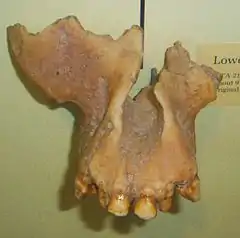Ankarapithecus
Ankarapithecus is a genus of extinct ape. It was probably frugivorous, and would have weighed about 27 kilograms (60 lb). Its remains were found close to Ankara in central Turkey beginning in the 1950s.[1] It lived during the Late Miocene[2] and was similar to Sivapithecus.
| Ankarapithecus Temporal range: Late Miocene | |
|---|---|
 | |
| part of the skull at the Natural History Museum, London | |
| Scientific classification | |
| Kingdom: | Animalia |
| Phylum: | Chordata |
| Class: | Mammalia |
| Order: | Primates |
| Suborder: | Haplorhini |
| Infraorder: | Simiiformes |
| Family: | Hominidae |
| Subfamily: | Ponginae |
| Tribe: | †Sivapithecini |
| Genus: | †Ankarapithecus Alpagut et al., 1996 |
| Species: | †A. meteai |
| Binomial name | |
| †Ankarapithecus meteai Alpagut et al., 1996 | |
References
- New York Times, Anthropologists Find Rare Kind of Ape Fossil
- Begun, David R. and Güleç, Erskin . 1998. Restoration of the Type and Palate of Ankarapithecus meteai: Taxonomic and Phylogenetic Implications. American Journal of Physical Anthropology 105:279–314.
This article is issued from Wikipedia. The text is licensed under Creative Commons - Attribution - Sharealike. Additional terms may apply for the media files.
